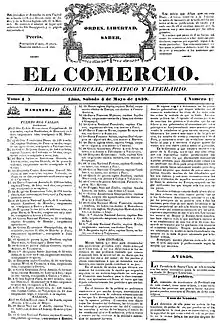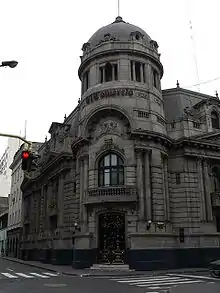 Issue 1 released 4 May 1839. | |
| Type | Daily newspaper |
|---|---|
| Format | Berliner (Monday–Friday) Broadsheet (Saturday–Sunday) |
| Owner(s) | El Comercio Group |
| Editor | Juan José Garrido Koechlin |
| Founded | 4 May 1839 |
| Political alignment | Conservatism |
| Language | Spanish |
| Headquarters | Lima |
| Circulation | 120,000 |
| Sister newspapers | Trome, Perú.21, Gestión, Depor, La Prensa. |
| Website | elcomercio |
El Comercio is a conservative[1][2] Peruvian newspaper based in Lima. Founded in 1839, it is the oldest newspaper in Peru and one of the oldest Spanish-language papers in the world. It has a daily circulation of more than 120,000. It is considered a newspaper of record[3] and one of the most influential media in Peru.
History

In the 1930s, Carlos Miró-Quesada Laos served as director of the newspaper and was a proponent for fascism in Peru.[4][5]
The military dictatorship of Juan Velasco Alvarado expropriated the newspaper in the mid-1970s. The company was returned to their original owners by President Fernando Belaúnde Terry on 28 July 1980, the same day he assumed office. It was his first official act upon assuming his presidency.
The newspaper is owned by shareholders of the Miró Quesada family, whose ownership of the company dates to 1875. Despite this, management is under control of an individual who is not a member of the family.
The company has ownership over its subsidiaries, the newspapers Peru 21 and Trome, and the magazine Somos.
The corporation, Empresa Editora El Comercio S.A., is the product of the merging of many companies in 1996. The company manages the editing, publication, and distribution of the newspaper, El Comercio, as well as the publication and distribution of Trome, Peru 21, and Gestion. In addition, they manage the advertising aspects of the mentioned publications. Additionally, they are devoted to the editing, publication, and distribution of many other books, magazines, pamphlets, weeklies, all sorts of graphic publications, Multimedia products, and videography. Informational content is distributed by their subsidiary Orbis Ventures S.A.C., a company in charge of the administration of the company's website.
The legal address of the company, where their administrative offices were in 300 Jr. Santa Rosa, Lima, Lima, Peru. Their publishing factories, Pando and Amauta, are in the districts of Pueblo Libre and the Cercado of Lima.
The new legal address is in 171 Av. Jorge Salazar Araoz, La Victoria, Lima.
Financially, the company operates very independently, as the effects of consolidation have not in large part affected the operation of their subsidiaries, Orbis Ventures S.A.C., Zetta Comunicadores del Perú S.A.E.M.A., EC Jobs S.A.C., Punto y Coma Editores S.A.C., Suscripciones Integrales S.A.C., Amauta Impressiones Comerciales, Producciones Cantabria S.A.C., Inmobiliaria El Sol S.A. and Grupo PluralTV.
Team of Ricardo Uceda
In 1994, Ricardo Uceda resigned as editor-in-chief of Sí to form a special investigative team at El Comercio.[6] As with Uceda's Sí reporting, the Comercio team focused on cases of governmental corruption.[7] One their most notable successes came in 1998, when they exposed the misuse of state funds intended for the survivors of floods and mudslides induced by the 1997-98 El Niño event; the story resulted in the arrest and imprisonment of Civil Defense Chief General Homero Nureña.[6]
Political alignment
The newspaper has been described as conservative and holding an ideological position is center-right.[1][2][8] Barnhurst described El Comercio as "the most conservative newspaper" in Peru in a review of the media in the nation.[2] According to Wayka, Elisabeth Dulanto Baquerizo de Miró Quesada, a member of the Miró Quesada family which owns El Comercio Group, signed the Madrid Charter and has helped hold events for the anti-leftist organization Madrid Forum, a group that was organized by the far-right Spanish party Vox.[9]
See also
References
- 1 2 Aquino, Marco (28 June 2021). "Peru's Fujimori loses allies as bid to flip election result falters". Reuters. Retrieved 1 May 2023.
- 1 2 3 Barnhurst, Kevin G. (1994). "Layout as Political Expression: Visual Literacy and the Peruvian Press". Visual Literacy in the Digital Age.
El Comercio, the most conservative newspaper with the most space, covered many stories about terrorism, but tended to bury them inside
- ↑ "Amazon Indian protest leader seeks refuge in Nicaraguan embassy". France 24. Agence France-Presse. 9 June 2009. Archived from the original on 27 November 2023. Retrieved 27 November 2023.
- ↑ López Soria, José Ignacio (1981). El Pensamiento fascista, 1930-1945 (in Spanish). Mosca Azul Editores.
- ↑ Ciccarelli, Orazio (August 1990). "Fascism and Politics in Peru during the Benavides Regime, 1933-39: The Italian Perspective". The Hispanic American Historical Review. 70 (3): 405. doi:10.2307/2516615.
- 1 2 Michael Kudliak (2000). "IPI WORLD PRESS FREEDOM HEROES". freemedia.at. Archived from the original on 27 June 2010. Retrieved 1 June 2011.
- ↑ "Ricardo Uceda". Lettre Ulysses Award for the Art of Reportage. Archived from the original on 21 July 2011. Retrieved 1 June 2011.
- ↑ "Los 24 Periódicos de Izquierda y Derecha Más Importantes". 18 February 2020.
- ↑ "Los empresarios aliados del Foro Madrid, el encuentro de la extrema derecha fascista". Wayka (in Spanish). 14 April 2023. Retrieved 26 April 2023.